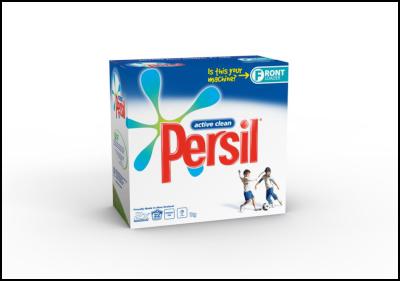Survey Reveals Kiwi Kids More Active Than Others Globally
MEDIA RELEASE
22 February
2013
Survey Reveals Kiwi Kids More Active Than Others Globally
Kiwi parents concerned about the amount of physical activity their children are getting each day can rest assured, thanks to recent survey findings* showing that Kiwi kids spend more time being active when compared with other children around the globe.
Results from the survey, conducted by Persil laundry powder, show that when compared to our closest neighbour, Kiwi children spend more time outdoors than Australian children overall. Alarmingly, 37 percent of Australian children typically spend less than 30 minutes a day being active outside#, while in New Zealand only five percent of children fall into this category.
Staying true to Kiwis’ love of the great outdoors, four in five New Zealand children spend more than an hour outside each day, with parents indicating that, in general, kids preferred to spend time outside playing with toys or friends.
Child Psychologist, Jackie Riach, says, “It’s important for children to engage in a range of activities including outdoor physical play. Active play helps children to build confidence, develop their motor skills and enhances their emotional well-being.”
The survey also revealed that Kiwi children are also spending less time on electronic devices, with eighty percent having two hours or less ‘screen time’ each day. This result contrasts dramatically with a recent study in the US, which showed that American children are spending on average, more than seven hours a day using electronics†.
Four out of five Kiwi parents have rules around limiting time spent using electronics. Riach says, “Setting family rules helps children to accept limits. A few age appropriate rules help children to know what is expected of them, and this might include specific rules about the amount of time spent on electronic devices and the type of content they are allowed to access.”
Parents are also doing a great job at keeping kids active and encouraging children to spend time outside in a variety of ways, with the most popular being taking their kids to the park and planning family days out. Canterbury kids blaze the trail when it comes to sport with one in two playing, compared to one in three Auckland, Wellington and Waikato children.
Active kids result in grubby clothes and any parent that does laundry will be familiar with stubborn stains including grass, mud and food. Persil, voted the number one laundry detergent by Consumer, is here to help clean up, no matter what kids choose to keep active.
Consumer Editor, David Naulls, says, “We tested 14 powders in front-loading and top-loading washing machines to find which removed the toughest stains most effectively, including clay, grass and motor oil. Persil was a clear leader in performance, earning a Consumer recommendation for its proven cleaning ability.”
Persil contains extra cleaning power with pre-treaters that are designed to be tough on the most stubborn stains, so don’t be afraid to send your child into the great New Zealand outdoors, because Persil will take care of the mess.
Key Survey
Results
Q: What activities does your child spend MOST of
their time doing? (select all that
apply)
a) Sport 32.6%
b) Arts &
Crafts 37.5%
c) Reading 36.0%
d) Playing
outside with toys or friends 66.7%
e) Playing inside
with toys or friends 57.1%
f) Cooking or
baking 14.2%
g) Television 38.3%
h) Video/computer
games 29.5%
i) Internet 20.3%
j) Other 7.3%
Q:
On average, how many hours per day does your child spend
playing outside?
a) 0 – 30 minutes 4.6%
b) 30
minutes – 1 hour 17.2%
c) 1 – 2
hours 36.8%
d) 2 – 3 hours 22.6%
e) 3 hours
+ 18.8%
Q: On average, how many hours per day does
your child spend playing inside using electronics (including
TV, computer games, internet, smartphone, tablet)?
a) 0
– 30 minutes 15.7%
b) 30 minutes – 1
hour 29.9%
c) 1 – 2 hours 29.5%
d) 2 – 3
hours 14.6%
e) 3 hours + 10.3%
Q: Do you have
rules around your child’s use of
electronics?
a) Yes 83.1%
b) No 16.9%
Q:
What do you do to encourage your child to spend time
outside?
a) Sign them up to play sport 30.3%
b) Take
them to the park 70.1%
c) Send them out into the
backyard 59.8%
a) Spend time doing activities with
family pets 24.5%
b) Plan activity based family days
out 60.6%
c) Other 14.9%
*Based on findings
of a Persil survey with 261 respondents, as at January 2013.
#International Journal of Behavioral Nutrition and
Physical Activity, online March 16, 2009.
www.reuters.com/article/2009/03/27/us-kids-outdoors-idUSTRE52Q3TQ20090327
†
Generation M2: Media in the Lives of 8- to
18-Year-Olds
www.kff.org/entmedia/entmedia012010nr.cfm



Notes:
Persil is available from supermarkets nationwide. RRP from $4.59.
About Unilever
Unilever works to create a better future every day. Our company helps people feel good, look good and get more out of life with brands and services that are good for them and good for others.
Unilever is one of the world’s leading fast-moving consumer goods companies, with strong local roots in more than 100 countries. Globally, Unilever has around 163,000 employees, and in 2009 generated annual sales of €40 billion. In Australasia, Unilever employs more than 1,600 people, and has offices and manufacturing facilities throughout Australia and New Zealand.
Unilever’s portfolio features some of the world’s best-known household names. In New Zealand, our name brands include Flora, Choysa, Dove, Rexona, Vaseline, Simple, Sunsilk, TRESemmé, Persil, Surf, Continental and Streets.
For more information about Unilever and its brands, please visit www.unilever.co.nz
ENDS


 PSGR: Has MBIE Short-Circuited Good Process In Recent Government Reforms?
PSGR: Has MBIE Short-Circuited Good Process In Recent Government Reforms? The Reserve Bank of New Zealand: RBNZ’s Five Year Funding Agreement Published
The Reserve Bank of New Zealand: RBNZ’s Five Year Funding Agreement Published Lodg: Veteran Founders Disrupting Sole-Trader Accounting in NZ
Lodg: Veteran Founders Disrupting Sole-Trader Accounting in NZ New Zealand Airports Association: Airports Welcome Tourism Marketing Turbocharge
New Zealand Airports Association: Airports Welcome Tourism Marketing Turbocharge Ipsos: New Zealanders Are Still Finding It Tough Financially; Little Reprieve Expected In The Next 12 Months
Ipsos: New Zealanders Are Still Finding It Tough Financially; Little Reprieve Expected In The Next 12 Months NZ Telecommunications Forum - TCF: Telecommunications Forum Warns Retailers About 3G Shutdown
NZ Telecommunications Forum - TCF: Telecommunications Forum Warns Retailers About 3G Shutdown



